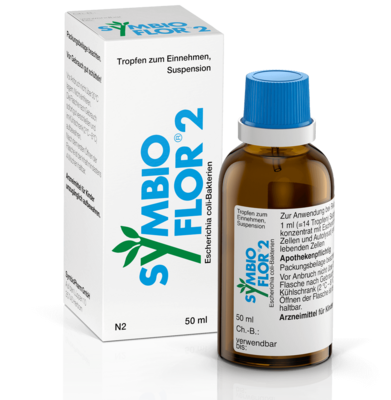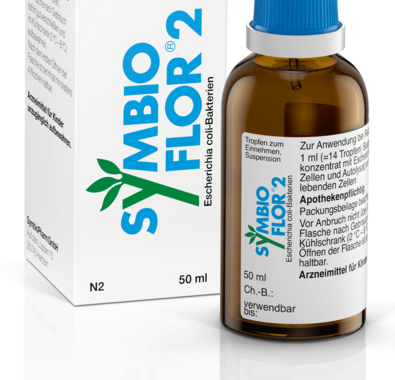CHRONIC BOWEL DISEASES
How to recognize and treat irritable bowel syndrome
People with irritable bowel syndrome suffer greatly from unpleasant symptoms such as abdominal pain, diarrhea, constipation and bloating. In Germany, around 10–15% of the population suffer from this debilitating disorder of the digestive tract.
Conventional medicine only offers a few pharmacological substances, predominantly palliative in nature, and which usually only address a single symptom in isolation. For example, antispasmodics (which suppress muscle spasms) are used to treat the pain. Other pharmacological substances act against diarrhea, and others against constipation and bloating. Patients with manifest irritable bowel syndrome often have to make do with taking a variety of medicines after consulting numerous doctors. One exception, which studies have shown to act against all the symptoms of irritable bowel syndrome, is the probiotic drug Symbioflor® 2
This article contains information about these topics
Characteristic symptoms of irritable bowel syndrome
A variety of bowel symptoms may indicate irritable bowel syndrome.
Characteristic of irritable bowel syndrome (IBS) are chronic bowel symptoms which can manifest as abdominal pain, diarrhea or constipation and bloating.
The symptoms frequently alternate. Especially prior to and during evacuation of the bowels, irritable bowel syndrome can cause agonizing bloating and spasmodic abdominal pain. Afterwards the sufferer generally enjoys short-term relief.
However, routine examinations do not reveal any pathological changes in the organs. A diagnosis of irritable bowel syndrome is therefore a diagnosis by exclusion – that is, the doctors have not been able to find an organic cause for the symptoms.
Although the symptoms of irritable bowel syndrome can have a significant negative impact on the wellbeing of the sufferer, the condition itself is not dangerous. Actually, individuals with irritable bowel syndrome usually undergo more examinations than the average population, which means that changes to the gut and intestinal mucosa are detected at an early stage and life expectancy is higher.
FINDING THE CAUSE
Diagnosis of irritable bowel syndrome by a doctor
The investigation of irritable syndrome is still a diagnosis by exclusion.
When diagnosing irritable bowel syndrome, other diseases such as chronic inflammatory bowel diseases or bowel cancer have to be excluded. An investigation such as a colonoscopy is suitable for this purpose. Food allergies and intolerances can also cause symptoms such as stomach pains, diarrhea and constipation and must also be investigated before starting IBS treatment. It is not unusual that a case of irritable bowel syndrome turns out in fact to be an undetected food allergy or intolerance. Similarly, a histamine intolerance can cause symptoms similar to those of irritable bowel syndrome.
However, food intolerances can often accompany irritable bowel syndrome. A food diary can help in the search for foods that cannot be tolerated. If allergies or intolerances are suspected, the treating doctor can arrange for laboratory testing.
In order to exclude other diseases, extensive studies are necessary, such as blood and faeces tests, gastroscopies and colonoscopies, ultrasound and hydrogen (H) breath tests. For many sufferers this is stressful – although it can also be reassuring when many serious diseases are excluded.
It is not uncommon that irritable bowel syndrome is traced back to a prior gastrointestinal infection (post-infectious IBS). In this case it is immaterial whether the infection had a bacterial or viral cause
Exclusion checklist of bowel diseases
Various diseases can have similar symptoms and must be excluded prior to treatment.
Acute gastrointestinal diseases
Small intestinal bacterial overgrowth (SIBO)
Chronic inflammatory bowel diseases such as ulcerative colitis and Crohn’s disease
Diverticular disease (diverticulosis) or inflamed diverticula (diverticulitis)
Diseases of the pancreas, gall bladder, liver or stomach such as inflammation, gall stones, fatty liver, gastritis
In women: gynecological diseases
Helicobacter pylori infections in the stomach
Histamine intolerance
Carbohydrate intolerance, e.g. to fructose, lactose or sorbitol
Cancer
Food allergies and intolerances
Coeliac disease and gluten intolerance or sensitivity
Irritable bowel syndrome diagnosis
Altered intestinal flora, underlying inflammation and increased dysbiosis.
Studies have shown that underlying inflammation is common in people with irritable bowel syndrome. In contrast, manifest inflammation demonstrated by increased CRP levels does not occur.
Depending on its composition, the intestinal flora can promote or inhibit inflammation. In particular butyric acid, a short-chain fatty acid, has an anti-inflammatory effect. However, patients with irritable bowel syndrome often lack precisely those bacteria in the intestinal flora that produce adequate quantities of butyric acid.
A highly permeable intestinal mucosa (leaky gut) can also be responsible for irritable bowel symptoms. In this case as well, harmful stimulants, medications and stress may be the cause. In addition, the composition of the intestinal flora is important: while useful bacteria help keep the intestinal mucosa intact, pathogenic organisms can attack the intestinal barrier.
Moreover, people with irritable gut syndrome often have increased numbers of certain cells (mast cells) in the gut, which are located close to free nerve endings. Normally these cells function to trigger beneficial inflammatory responses, e.g. in the case of healing wounds. For this purpose, they can release histamine, an important tissue hormone that can cause blood vessels to expand, for example. Many patients with irritable bowel syndrome have too many mast cells in their gut. The mast cells in these patients are not only present in excessive quantities, they are also highly responsive. Thus, they respond even to mild stimuli (stretching of the gut wall after eating) by releasing histamine, serotonin and protein-degrading enzymes (proteases), which can trigger inflammation, pain and increased intestinal motility with subsequent diarrhea.
TREATMENT
Natural and sustainable treatment for irritable bowel syndrome
Treatment with the probiotic drug Symbioflor® 2
Various intestinal bacteria – such as E. coli, a normal inhabitant of the gut – have an anti-inflammatory effect. In addition, E. coli can produce its own defensive substances against unwanted pathogens or stimulate the intestinal mucosa to release more defensive substances. Moreover, the non-pathogenic E. coli strains influence the composition of the intestinal flora. And high doses of probiotic E. coli can stabilize mast cells. This means that their contents remain inside the cells.
The probiotic drug Symbioflor® 2 contains a high concentration of the natural – non-pathogenic – intestinal bacterium E. coli in a pure form. The bacteria help to compensate for deficits in the intestinal flora and intestinal mucosa. A laboratory study has shown that they can also stabilize mast cells. By this means, the disrupted intestinal flora can re-equilibrate and digestion is regulated.
In a study with irritable bowel syndrome patients, Symbioflor® 2 effectively alleviated abdominal pain and bloating. It also had a positive effect on stool consistency and intestinal motility, resulting in decreased stool frequency in patients with diarrhea. Moreover, there was a significant improvement in quality of life for these patients.
Up until around ten years ago it was primarily doctors with a naturopathic orientation who used probiotic drug s containing bacteria for irritable bowel syndrome. Nowadays this form of treatment is found in guidelines for the treatment of irritable bowel syndrome, and even many conventional practitioners now use probiotic drugs containing bacteria to treat irritable bowel syndrome.
Emergency relief for irritable bowel syndrome symptoms
While irritable bowel medications with natural intestinal bacteria regulate the intestinal flora in the long term, thereby targeting the causes of irritable bowel syndrome, sufferers also require rapid relief for acute symptoms. Which medications are the most suitable depends on which symptom the patient suffers from the most:
Those individuals suffering from constipation will benefit from dietary fiber such as psyllium husks and a high-fiber diet with wholegrain foods, vegetables and fruit. Dietary fiber stimulates intestinal activity. In the case of acute constipation, laxatives such as lactulose or lactitol can help. It is also important to drink plenty of liquids.
For those individuals who suffer from diarrhea, swelling agents that absorb excess water in the gut are suitable. Psyllium husks are also beneficial.
Tannins from strongly brewed black tea or oak bark tea have a sealing effect, inhibit secretion, are anti-inflammatory and also have a binding effect. Caution: do not consume tannins for an extended period, as they also impede the absorption of calcium and iron from the gut.
In the case of very severe diarrhea, a doctor can prescribe medication that inhibits intestinal motility. This results in the faeces being excreted more slowly. However, these medicines should be used with caution, as they may have serious side effects. In addition, they do not help if unwanted intestinal bacteria produce gases that make the stool more liquid.
Individuals who suffer from bloating can benefit from changing to a low-FODMAP diet. In acute cases medications that destroy the mucus layer around the gas bubbles that cause bloating, can help. It is then easier for the gas to escape.
Individuals who suffer from pain can use relaxant medications or natural substances such as peppermint oil. They relax the gastrointestinal muscles, thereby easing abdominal pain. Heat can also be beneficial for abdominal pain. In the case of very strong pain, a doctor can also prescribe a low dose of antidepressants





